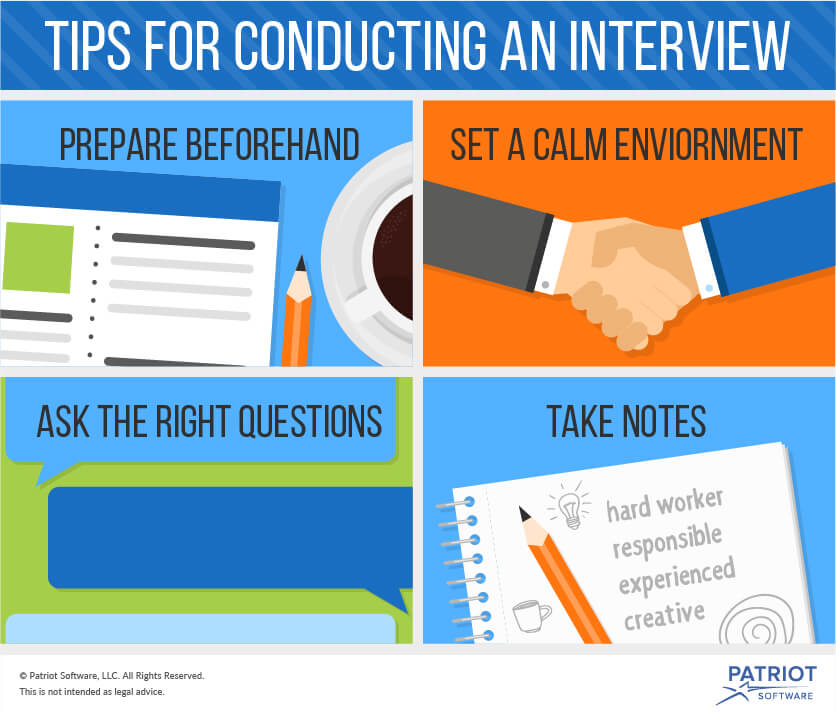As a small business owner, conducting interviews is one of your responsibilities. You might be just as nervous as the people you interview. Or, you might worry that you won’t hire the right person after the interviews. Here are some tips for conducting an interview.
Tips for conducting an interview
Successfully conducting an interview means asking the right questions to really get to know the candidate. And, you want to make sure that both you and the candidate are relaxed and comfortable.
Once you figure out the best places to find employees and put together a shortlist of qualified candidates, you need to interview them to pick the one who will help grow your business. Without a successful interview, you might miss out on a candidate with incredible potential to excel at your small business.
Take a look at these four tips for conducting an interview to select the right fit for the job.

1. Prepare beforehand
Candidates interviewing for a job prepare answers to potential questions an interviewer would ask. It’s important for interviewers to be prepared as well. Knowing how to hire great employees starts with learning how to conduct an interview.
Understand the duties of the position you are hiring for. Make sure you are able to tell a candidate what they will be doing and the skills they need. If you don’t quite know the scope of the position, you might end up looking for the wrong skill set.
For example, you might not know much about computer programming besides the fact that you need someone to do it. Your accounting and payroll business might require someone who can code accounting software. Make sure you prepare so you know what skills the position needs. Talk to people in that industry or see what qualifications similar positions are looking for.
Thoroughly look over each candidate’s resume and cover letter before the interview. Go through and highlight what skills, experience, or education relates to the position you are hiring for. You can later ask them to expand on information on their resume in the interview.
You can also research each candidate prior to the interview. Platforms like social media and professional networking help interviewers learn a little bit about candidates before they meet them. You can get an idea of whether a candidate will fit with your company’s culture based on their behavior online.
2. Set a relaxing environment
The candidate is most likely nervous. You want someone who can adapt in any situation, but you also don’t want to make the interviewee uncomfortable. Help ease the candidate’s nerves by setting a relaxed environment.
Offer to get the candidate coffee or water before you begin. Then, get to know the candidate. Don’t jump right into questions about why they’re perfect for the job. Instead, ask them how their day is going or what hobbies they like to do.
By making the interview a conversation, both you and the interviewee relax. That way, they feel comfortable showing you why they qualify for the job.
3. Ask the right questions
The recruiting process comes down to the questions you ask (and answer). Even with the perfect candidate, you need to ask the right questions to get the answers you’re looking for. Asking things like, “Why do you think you’d be a good fit for this job?” is good, but it is not enough.
Ask the candidate situational questions. People can talk all they want about why they’d be good, but actually putting them to the test will help you weed out the unqualified.
Maybe you had a situation at work that put you in a tough position. Ask the candidate what they would do if they were in that situation. That can help you see if they are quick on their feet when it comes to handling real-life business problems.
Be sure you ask each candidate the same questions. You don’t want to just read off a list without making the interview conversational, but you do want to be consistent.
4. Take notes
Interviews go quickly. You’re in there for 30 minutes or one hour with each candidate, and you might interview people over the course of a few weeks.
Take notes during the interview. It might make a candidate nervous at first, but it can help to remember what they said. And, taking notes will help you compare different candidates.
Your takeaway for conducting interviews
Interviewing is one of the most important aspects of being a small business owner. You want employees who fit with your company’s culture and your vision.
Conducting an interview doesn’t have to be scary for you or the candidate you’re interviewing. By keeping in mind the above tips for conducting an interview, you can make the process enjoyable and simple.
This is not intended as legal advice; for more information, please click here.



